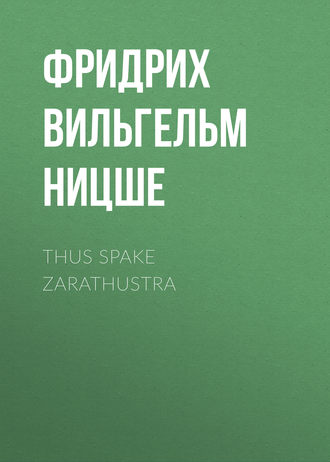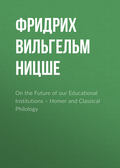
Фридрих Вильгельм Ницше
Thus Spake Zarathustra
LXIX. THE SHADOW
Scarcely however was the voluntary beggar gone in haste, and Zarathustra again alone, when he heard behind him a new voice which called out: “Stay! Zarathustra! Do wait! It is myself, forsooth, O Zarathustra, myself, thy shadow!” But Zarathustra did not wait; for a sudden irritation came over him on account of the crowd and the crowding in his mountains. “Whither hath my lonesomeness gone?” spake he.
“It is verily becoming too much for me; these mountains swarm; my kingdom is no longer of THIS world; I require new mountains.
My shadow calleth me? What matter about my shadow! Let it run after me! I – run away from it.”
Thus spake Zarathustra to his heart and ran away. But the one behind followed after him, so that immediately there were three runners, one after the other – namely, foremost the voluntary beggar, then Zarathustra, and thirdly, and hindmost, his shadow. But not long had they run thus when Zarathustra became conscious of his folly, and shook off with one jerk all his irritation and detestation.
“What!” said he, “have not the most ludicrous things always happened to us old anchorites and saints?
Verily, my folly hath grown big in the mountains! Now do I hear six old fools’ legs rattling behind one another!
But doth Zarathustra need to be frightened by his shadow? Also, methinketh that after all it hath longer legs than mine.”
Thus spake Zarathustra, and, laughing with eyes and entrails, he stood still and turned round quickly – and behold, he almost thereby threw his shadow and follower to the ground, so closely had the latter followed at his heels, and so weak was he. For when Zarathustra scrutinised him with his glance he was frightened as by a sudden apparition, so slender, swarthy, hollow and worn-out did this follower appear.
“Who art thou?” asked Zarathustra vehemently, “what doest thou here? And why callest thou thyself my shadow? Thou art not pleasing unto me.”
“Forgive me,” answered the shadow, “that it is I; and if I please thee not – well, O Zarathustra! therein do I admire thee and thy good taste.
A wanderer am I, who have walked long at thy heels; always on the way, but without a goal, also without a home: so that verily, I lack little of being the eternally Wandering Jew, except that I am not eternal and not a Jew.
What? Must I ever be on the way? Whirled by every wind, unsettled, driven about? O earth, thou hast become too round for me!
On every surface have I already sat, like tired dust have I fallen asleep on mirrors and window-panes: everything taketh from me, nothing giveth; I become thin – I am almost equal to a shadow.
After thee, however, O Zarathustra, did I fly and hie longest; and though I hid myself from thee, I was nevertheless thy best shadow: wherever thou hast sat, there sat I also.
With thee have I wandered about in the remotest, coldest worlds, like a phantom that voluntarily haunteth winter roofs and snows.
With thee have I pushed into all the forbidden, all the worst and the furthest: and if there be anything of virtue in me, it is that I have had no fear of any prohibition.
With thee have I broken up whatever my heart revered; all boundary-stones and statues have I o’erthrown; the most dangerous wishes did I pursue, – verily, beyond every crime did I once go.
With thee did I unlearn the belief in words and worths and in great names. When the devil casteth his skin, doth not his name also fall away? It is also skin. The devil himself is perhaps – skin.
‘Nothing is true, all is permitted’: so said I to myself. Into the coldest water did I plunge with head and heart. Ah, how oft did I stand there naked on that account, like a red crab!
Ah, where have gone all my goodness and all my shame and all my belief in the good! Ah, where is the lying innocence which I once possessed, the innocence of the good and of their noble lies!
Too oft, verily, did I follow close to the heels of truth: then did it kick me on the face. Sometimes I meant to lie, and behold! then only did I hit – the truth.
Too much hath become clear unto me: now it doth not concern me any more. Nothing liveth any longer that I love, – how should I still love myself?
‘To live as I incline, or not to live at all’: so do I wish; so wisheth also the holiest. But alas! how have I still – inclination?
Have I– still a goal? A haven towards which MY sail is set?
A good wind? Ah, he only who knoweth WHITHER he saileth, knoweth what wind is good, and a fair wind for him.
What still remaineth to me? A heart weary and flippant; an unstable will; fluttering wings; a broken backbone.
This seeking for MY home: O Zarathustra, dost thou know that this seeking hath been MY home-sickening; it eateth me up.
‘WHERE is – MY home?’ For it do I ask and seek, and have sought, but have not found it. O eternal everywhere, O eternal nowhere, O eternal – in-vain!”
Thus spake the shadow, and Zarathustra’s countenance lengthened at his words. “Thou art my shadow!” said he at last sadly.
“Thy danger is not small, thou free spirit and wanderer! Thou hast had a bad day: see that a still worse evening doth not overtake thee!
To such unsettled ones as thou, seemeth at last even a prisoner blessed. Didst thou ever see how captured criminals sleep? They sleep quietly, they enjoy their new security.
Beware lest in the end a narrow faith capture thee, a hard, rigorous delusion! For now everything that is narrow and fixed seduceth and tempteth thee.
Thou hast lost thy goal. Alas, how wilt thou forego and forget that loss? Thereby – hast thou also lost thy way!
Thou poor rover and rambler, thou tired butterfly! wilt thou have a rest and a home this evening? Then go up to my cave!
Thither leadeth the way to my cave. And now will I run quickly away from thee again. Already lieth as it were a shadow upon me.
I will run alone, so that it may again become bright around me. Therefore must I still be a long time merrily upon my legs. In the evening, however, there will be – dancing with me!” —
Thus spake Zarathustra.
LXX. NOONTIDE
– And Zarathustra ran and ran, but he found no one else, and was alone and ever found himself again; he enjoyed and quaffed his solitude, and thought of good things – for hours. About the hour of noontide, however, when the sun stood exactly over Zarathustra’s head, he passed an old, bent and gnarled tree, which was encircled round by the ardent love of a vine, and hidden from itself; from this there hung yellow grapes in abundance, confronting the wanderer. Then he felt inclined to quench a little thirst, and to break off for himself a cluster of grapes. When, however, he had already his arm out-stretched for that purpose, he felt still more inclined for something else – namely, to lie down beside the tree at the hour of perfect noontide and sleep.
This Zarathustra did; and no sooner had he laid himself on the ground in the stillness and secrecy of the variegated grass, than he had forgotten his little thirst, and fell asleep. For as the proverb of Zarathustra saith: “One thing is more necessary than the other.” Only that his eyes remained open: – for they never grew weary of viewing and admiring the tree and the love of the vine. In falling asleep, however, Zarathustra spake thus to his heart:
“Hush! Hush! Hath not the world now become perfect? What hath happened unto me?
As a delicate wind danceth invisibly upon parqueted seas, light, feather-light, so – danceth sleep upon me.
No eye doth it close to me, it leaveth my soul awake. Light is it, verily, feather-light.
It persuadeth me, I know not how, it toucheth me inwardly with a caressing hand, it constraineth me. Yea, it constraineth me, so that my soul stretcheth itself out: —
– How long and weary it becometh, my strange soul! Hath a seventh-day evening come to it precisely at noontide? Hath it already wandered too long, blissfully, among good and ripe things?
It stretcheth itself out, long – longer! it lieth still, my strange soul. Too many good things hath it already tasted; this golden sadness oppresseth it, it distorteth its mouth.
– As a ship that putteth into the calmest cove: – it now draweth up to the land, weary of long voyages and uncertain seas. Is not the land more faithful?
As such a ship huggeth the shore, tuggeth the shore: – then it sufficeth for a spider to spin its thread from the ship to the land. No stronger ropes are required there.
As such a weary ship in the calmest cove, so do I also now repose, nigh to the earth, faithful, trusting, waiting, bound to it with the lightest threads.
O happiness! O happiness! Wilt thou perhaps sing, O my soul? Thou liest in the grass. But this is the secret, solemn hour, when no shepherd playeth his pipe.
Take care! Hot noontide sleepeth on the fields. Do not sing! Hush! The world is perfect.
Do not sing, thou prairie-bird, my soul! Do not even whisper! Lo – hush! The old noontide sleepeth, it moveth its mouth: doth it not just now drink a drop of happiness —
– An old brown drop of golden happiness, golden wine? Something whisketh over it, its happiness laugheth. Thus – laugheth a God. Hush! —
– ‘For happiness, how little sufficeth for happiness!’ Thus spake I once and thought myself wise. But it was a blasphemy: THAT have I now learned. Wise fools speak better.
The least thing precisely, the gentlest thing, the lightest thing, a lizard’s rustling, a breath, a whisk, an eye-glance – LITTLE maketh up the BEST happiness. Hush!
– What hath befallen me: Hark! Hath time flown away? Do I not fall? Have I not fallen – hark! into the well of eternity?
– What happeneth to me? Hush! It stingeth me – alas – to the heart? To the heart! Oh, break up, break up, my heart, after such happiness, after such a sting!
– What? Hath not the world just now become perfect? Round and ripe? Oh, for the golden round ring – whither doth it fly? Let me run after it! Quick!
Hush – ” (and here Zarathustra stretched himself, and felt that he was asleep.)
“Up!” said he to himself, “thou sleeper! Thou noontide sleeper! Well then, up, ye old legs! It is time and more than time; many a good stretch of road is still awaiting you —
Now have ye slept your fill; for how long a time? A half-eternity! Well then, up now, mine old heart! For how long after such a sleep mayest thou – remain awake?”
(But then did he fall asleep anew, and his soul spake against him and defended itself, and lay down again) – “Leave me alone! Hush! Hath not the world just now become perfect? Oh, for the golden round ball! —
“Get up,” said Zarathustra, “thou little thief, thou sluggard! What! Still stretching thyself, yawning, sighing, falling into deep wells?
Who art thou then, O my soul!” (and here he became frightened, for a sunbeam shot down from heaven upon his face.)
“O heaven above me,” said he sighing, and sat upright, “thou gazest at me? Thou hearkenest unto my strange soul?
When wilt thou drink this drop of dew that fell down upon all earthly things, – when wilt thou drink this strange soul —
– When, thou well of eternity! thou joyous, awful, noontide abyss! when wilt thou drink my soul back into thee?”
Thus spake Zarathustra, and rose from his couch beside the tree, as if awakening from a strange drunkenness: and behold! there stood the sun still exactly above his head. One might, however, rightly infer therefrom that Zarathustra had not then slept long.
LXXI. THE GREETING
It was late in the afternoon only when Zarathustra, after long useless searching and strolling about, again came home to his cave. When, however, he stood over against it, not more than twenty paces therefrom, the thing happened which he now least of all expected: he heard anew the great CRY OF DISTRESS. And extraordinary! this time the cry came out of his own cave. It was a long, manifold, peculiar cry, and Zarathustra plainly distinguished that it was composed of many voices: although heard at a distance it might sound like the cry out of a single mouth.
Thereupon Zarathustra rushed forward to his cave, and behold! what a spectacle awaited him after that concert! For there did they all sit together whom he had passed during the day: the king on the right and the king on the left, the old magician, the pope, the voluntary beggar, the shadow, the intellectually conscientious one, the sorrowful soothsayer, and the ass; the ugliest man, however, had set a crown on his head, and had put round him two purple girdles, – for he liked, like all ugly ones, to disguise himself and play the handsome person. In the midst, however, of that sorrowful company stood Zarathustra’s eagle, ruffled and disquieted, for it had been called upon to answer too much for which its pride had not any answer; the wise serpent however hung round its neck.
All this did Zarathustra behold with great astonishment; then however he scrutinised each individual guest with courteous curiosity, read their souls and wondered anew. In the meantime the assembled ones had risen from their seats, and waited with reverence for Zarathustra to speak. Zarathustra however spake thus:
“Ye despairing ones! Ye strange ones! So it was YOUR cry of distress that I heard? And now do I know also where he is to be sought, whom I have sought for in vain to-day: THE HIGHER MAN – :
– In mine own cave sitteth he, the higher man! But why do I wonder! Have not I myself allured him to me by honey-offerings and artful lure-calls of my happiness?
But it seemeth to me that ye are badly adapted for company: ye make one another’s hearts fretful, ye that cry for help, when ye sit here together? There is one that must first come,
– One who will make you laugh once more, a good jovial buffoon, a dancer, a wind, a wild romp, some old fool: – what think ye?
Forgive me, however, ye despairing ones, for speaking such trivial words before you, unworthy, verily, of such guests! But ye do not divine WHAT maketh my heart wanton: —
– Ye yourselves do it, and your aspect, forgive it me! For every one becometh courageous who beholdeth a despairing one. To encourage a despairing one – every one thinketh himself strong enough to do so.
To myself have ye given this power, – a good gift, mine honourable guests! An excellent guest’s-present! Well, do not then upbraid when I also offer you something of mine.
This is mine empire and my dominion: that which is mine, however, shall this evening and tonight be yours. Mine animals shall serve you: let my cave be your resting-place!
At house and home with me shall no one despair: in my purlieus do I protect every one from his wild beasts. And that is the first thing which I offer you: security!
The second thing, however, is my little finger. And when ye have THAT, then take the whole hand also, yea, and the heart with it! Welcome here, welcome to you, my guests!”
Thus spake Zarathustra, and laughed with love and mischief. After this greeting his guests bowed once more and were reverentially silent; the king on the right, however, answered him in their name.
“O Zarathustra, by the way in which thou hast given us thy hand and thy greeting, we recognise thee as Zarathustra. Thou hast humbled thyself before us; almost hast thou hurt our reverence – :
– Who however could have humbled himself as thou hast done, with such pride? THAT uplifteth us ourselves; a refreshment is it, to our eyes and hearts.
To behold this, merely, gladly would we ascend higher mountains than this. For as eager beholders have we come; we wanted to see what brighteneth dim eyes.
And lo! now is it all over with our cries of distress. Now are our minds and hearts open and enraptured. Little is lacking for our spirits to become wanton.
There is nothing, O Zarathustra, that groweth more pleasingly on earth than a lofty, strong will: it is the finest growth. An entire landscape refresheth itself at one such tree.
To the pine do I compare him, O Zarathustra, which groweth up like thee – tall, silent, hardy, solitary, of the best, supplest wood, stately, —
– In the end, however, grasping out for ITS dominion with strong, green branches, asking weighty questions of the wind, the storm, and whatever is at home on high places;
– Answering more weightily, a commander, a victor! Oh! who should not ascend high mountains to behold such growths?
At thy tree, O Zarathustra, the gloomy and ill-constituted also refresh themselves; at thy look even the wavering become steady and heal their hearts.
And verily, towards thy mountain and thy tree do many eyes turn to-day; a great longing hath arisen, and many have learned to ask: ‘Who is Zarathustra?’
And those into whose ears thou hast at any time dripped thy song and thy honey: all the hidden ones, the lone-dwellers and the twain-dwellers, have simultaneously said to their hearts:
‘Doth Zarathustra still live? It is no longer worth while to live, everything is indifferent, everything is useless: or else – we must live with Zarathustra!’
‘Why doth he not come who hath so long announced himself?’ thus do many people ask; ‘hath solitude swallowed him up? Or should we perhaps go to him?’
Now doth it come to pass that solitude itself becometh fragile and breaketh open, like a grave that breaketh open and can no longer hold its dead. Everywhere one seeth resurrected ones.
Now do the waves rise and rise around thy mountain, O Zarathustra. And however high be thy height, many of them must rise up to thee: thy boat shall not rest much longer on dry ground.
And that we despairing ones have now come into thy cave, and already no longer despair: – it is but a prognostic and a presage that better ones are on the way to thee, —
– For they themselves are on the way to thee, the last remnant of God among men – that is to say, all the men of great longing, of great loathing, of great satiety,
– All who do not want to live unless they learn again to HOPE – unless they learn from thee, O Zarathustra, the GREAT hope!”
Thus spake the king on the right, and seized the hand of Zarathustra in order to kiss it; but Zarathustra checked his veneration, and stepped back frightened, fleeing as it were, silently and suddenly into the far distance. After a little while, however, he was again at home with his guests, looked at them with clear scrutinising eyes, and said:
“My guests, ye higher men, I will speak plain language and plainly with you. It is not for YOU that I have waited here in these mountains.”
(“‘Plain language and plainly?’ Good God!” said here the king on the left to himself; “one seeth he doth not know the good Occidentals, this sage out of the Orient!
But he meaneth ‘blunt language and bluntly’ – well! That is not the worst taste in these days!”)
“Ye may, verily, all of you be higher men,” continued Zarathustra; “but for me – ye are neither high enough, nor strong enough.
For me, that is to say, for the inexorable which is now silent in me, but will not always be silent. And if ye appertain to me, still it is not as my right arm.
For he who himself standeth, like you, on sickly and tender legs, wisheth above all to be TREATED INDULGENTLY, whether he be conscious of it or hide it from himself.
My arms and my legs, however, I do not treat indulgently, I DO NOT TREAT MY WARRIORS INDULGENTLY: how then could ye be fit for MY warfare?
With you I should spoil all my victories. And many of you would tumble over if ye but heard the loud beating of my drums.
Moreover, ye are not sufficiently beautiful and well-born for me. I require pure, smooth mirrors for my doctrines; on your surface even mine own likeness is distorted.
On your shoulders presseth many a burden, many a recollection; many a mischievous dwarf squatteth in your corners. There is concealed populace also in you.
And though ye be high and of a higher type, much in you is crooked and misshapen. There is no smith in the world that could hammer you right and straight for me.
Ye are only bridges: may higher ones pass over upon you! Ye signify steps: so do not upbraid him who ascendeth beyond you into HIS height!
Out of your seed there may one day arise for me a genuine son and perfect heir: but that time is distant. Ye yourselves are not those unto whom my heritage and name belong.
Not for you do I wait here in these mountains; not with you may I descend for the last time. Ye have come unto me only as a presage that higher ones are on the way to me, —
– NOT the men of great longing, of great loathing, of great satiety, and that which ye call the remnant of God;
– Nay! Nay! Three times Nay! For OTHERS do I wait here in these mountains, and will not lift my foot from thence without them;
– For higher ones, stronger ones, triumphanter ones, merrier ones, for such as are built squarely in body and soul: LAUGHING LIONS must come!
O my guests, ye strange ones – have ye yet heard nothing of my children? And that they are on the way to me?
Do speak unto me of my gardens, of my Happy Isles, of my new beautiful race – why do ye not speak unto me thereof?
This guests’-present do I solicit of your love, that ye speak unto me of my children. For them am I rich, for them I became poor: what have I not surrendered,
– What would I not surrender that I might have one thing: THESE children, THIS living plantation, THESE life-trees of my will and of my highest hope!”
Thus spake Zarathustra, and stopped suddenly in his discourse: for his longing came over him, and he closed his eyes and his mouth, because of the agitation of his heart. And all his guests also were silent, and stood still and confounded: except only that the old soothsayer made signs with his hands and his gestures.







